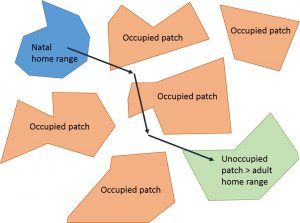Dispersal
Dispersal describes the movement out of one’s current home range in order to settle permanently somewhere else. Dispersal may lead to gene flow, (that is, the exchange of new genes between areas), if the dispersing individual succeeds in mating with a local individual.
There are many reasons why animals disperse, and it differs among species, genders and individuals of the same species. In brown bears, for example, males probably disperse because of an intrinsic motivation to avoid breeding with close relatives, whereas for the females, social competition among sisters seems to determine who disperse.



 This project (EDU-ARCTIC) has received funding from the European Union’s Horizon 2020 research and innovation programme under grant agreement No 710240. The content of the website is the sole responsibility of the Consortium and it does not represent the opinion of the European Commission, and the Commission is not responsible for any use that might be made of information contained.
This project (EDU-ARCTIC) has received funding from the European Union’s Horizon 2020 research and innovation programme under grant agreement No 710240. The content of the website is the sole responsibility of the Consortium and it does not represent the opinion of the European Commission, and the Commission is not responsible for any use that might be made of information contained.